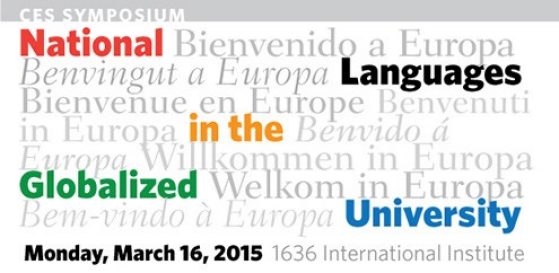- News
- Events
-
- Videos
- Annual Distinguished Lecture on Europe
- Symposia & Workshops
- Archived Events | 2011-15
- Search Events
The Center for European Studies occasionally hosts symposia and workshops on topics related to Europe. See below for future and past events.

National Languages in the Globalized University
March 16, 2015
The study of foreign languages in American universities is undergoing radical change. American university students are turning away from European national languages to embrace the global languages which they believe provide distinct advantages in a rapidly changing economy. At the same time, scholarship emphasizes languages in context—as part of the living fabric of human societies and cultures. This symposium brings together scholars of the major Western European languages—Spanish, French, German, Italian, and Portuguese—to discuss and debate the shifting position of national languages as an intellectual problem and the implications that these changes have had and will continue to have in American university classrooms.
Co-sponsors: Department of Romance Languages and Literatures, Department of Germanic Languages and Literatures, Institute for the Humanities, International Institute
Program
Riot at a Railway Station: Space, Race, and the Politics of Infrastructure in France
February 23, 2015
Julie Kleinman, Mellon Postdoctoral Fellow in the Humanities and visiting assistant professor of French at Oberlin College, leads this workshop on seeing and imagining public space in France. At the height of the French presidential election season in 2007, Paris’s Gare du Nord railway station erupted in what newspapers called a “riot” after the violent arrest of a Congolese man provoked confrontations between youth and police. The event staged the convergence of official and unofficial attempts to define and regulate spaces and subjects in Parisian public space.
 Crusade, Jihad, and the Multi-sectarian State
Crusade, Jihad, and the Multi-sectarian State
November 17, 2014
A symposium on the history, present state and future of religious violence in the Christian and Muslim context. It will focus on one dimension in particular of crusade and jihad: the tendency for struggles inspired by religious belief to evolve over time into a form of pietistic practice. Topics to be discussed will include religious motivations for surveillance, territorial expansion and military aggression; multi-sectarian states as vectors of instability as well as engines of cultural generation; and conversion and mobility as human rights and as legislative and policing issues.
Co-sponsors: Center for Middle Eastern and North African Studies, Islamic Studies Program, Weiser Center for Emerging Democracies
Program
Toward a Comparative History of the Modern Mediterranean
Professor Edmund (“Terry”) Burke III, professor emeritus and research professor of history and the University of California, Santa Cruz, leads this workshop, which aims to address a gap in the scholarship in order to reconsider the “Mediterranean” as a possible unit of analysis for the modern period. What is Mediterranean modernity? What does it mean to be modern? Are we modern yet? Or is modernity a disruption of the Mediterranean framework? These are just a few of the questions that will form the basis of our conversation in this workshop.professor of history and the University of California, Santa Cruz
Co-sponsors: Center for Middle Eastern and North African Studies, Islamic Studies Program, Mediterranean Topographies Interdisciplinary Workshop



